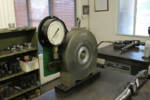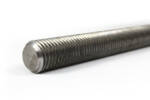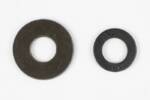Greg's FAQs
The rotational capacity test, sometimes referred to as a ROCAP test or RC test, serves as a quality control measure against excessively over-tapped nuts, a material with insufficient ductility, and generally assures that the assembly of elements (bolt, nut, and washer) will function together as a unit to achieve the required preloads. The test intends... Read more

There are three classes of thread fit associated with fasteners: Class 1A/1B, Class 2A/2B, Class 3A/3B. The “A” refers to the externally threaded fastener component, typically the bolt, while “B” refers to the internally threaded fastener component, usually a nut. As the number of thread class increases, the threading tolerances become more precise. Most construction... Read more

Not all grades of bolts require heat-treating, but those specifications that do are heat-treated after the heads are forged. Heat-treating is performed in a controlled environment using specific quenching and tempering temperatures and durations. The bolts are then tested to ensure the strength of the heat-treated bolts meet the requirements of the given specification. Since... Read more

Portland Bolt does not abide by the practice of shipping quantities of +/- 10%. We feel this policy is ludicrous. We ship exact quantities and the reason is explained below. Shipping +/- 10% is done as a cost-cutting measure by many manufacturers. Since several parts are lost during the manufacturing process (some are used for... Read more
ASTM A153 is a broad specification covering zinc coating (hot-dip) of iron and steel hardware. In the past, A153 was the hot-dip galvanizing specification referenced by ASTM construction fasteners. The problem was that ASTM Committee F16 on Fasteners did not have any jurisdiction over this specification. Therefore, in 2005 the F2329 fastener-specific hot-dip galvanizing specification was established.... Read more
ASTM B633 is a broad specification covering electrodeposited zinc coating applied to iron or steel. In the past, this was the zinc plating specification referenced by ASTM construction fasteners. The problem was that ASTM Committee F16 on Fasteners did not have any jurisdiction over this specification. Therefore, in 1998 the F1941 fastener-specific zinc plating specification was... Read more
The concern with galvanizing any high strength steel is the risk of hydrogen embrittlement. There is plenty of research on galvanizing high strength steels, but conclusions vary on the strength at which hydrogen embrittlement will likely occur when the parts are galvanized. Some research identifies 150 ksi tensile strength as a threshold, but other research... Read more

The ASTM F1554 specification does not prohibit or allow metric diameter F1554 anchor bolts. It does not address the subject of metric dimensions at all. So theoretically, if a manufacturer can locate metric steel round bar that meets both the chemical and mechanical requirements of the specification, metric F1554 anchor bolts can be provided. Since... Read more

According to ACI 318-05 Appendix D.1, a “Ductile Steel Element” is an element with a tensile test elongation of at least 14 percent and reduction in area of at least 30 percent. The minimum elongation percentage for any diameter of F1554 Grade 55 anchor rod is 21% and the minimum reduction of area percentage is... Read more
Standard flat washers are a mass-produced item that Portland Bolt stocks as an accessory to accompany custom sized bolts we manufacture. A washer is a steel ring placed under a nut and/or bolt head to spread the pressure when the assembly is tightened. A washer also creates a smooth bearing surface for the nut to turn... Read more


